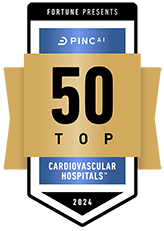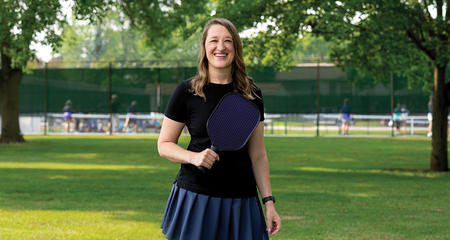Following heart surgery or a heart procedure, patients undergo a comprehensive program of exercise, risk factor modification and heart health education in the Cardiac Rehabilitation Program. Individual rehabilitation plans are designed to help patients get back on their feet. The program combines state-of-the-art exercise equipment with individualized patient education and exercise guidelines provided by certified staff. Our professional team includes registered nurses, exercise physiologists, registered dietary staff and behavioral health experts.
Cardiac Rehabilitation is composed of three phases: inpatient, outpatient and maintenance. The program begins while the patient is still in the hospital. Nursing staff and exercise physiologists work with patients to aid in range of motion, movement and walking. Upon discharge, patients begin the outpatient phase in which our specially trained staff develops an individualized rehabilitation plan designed to improve cardiovascular health and musculoskeletal strength. The length of the outpatient phase is determined by both exercise and educational goal attainment.
In addition to exercise, Cardiac Rehabilitation provides heart health education. Our health care professionals provide vital information about heart disease, risk factor management, proper nutrition and weight management, understanding exercise, heart disease treatments and stress management.
Patients seeking cardiac rehabilitation services must first get a prescription from a cardiologist or from their primary care physician. Prior to starting a cardiac rehabilitation program, patients should verify insurance coverage.
Find a Cardiac Rehabilitation Location
Intensive Cardiac Rehabilitation
Our Intensive Cardiac Rehabilitation (ICR) Program takes a holistic approach to patient recovery after a cardiac event. We have collaborated with Pritikin to offer ICR in our health network and have earned certification as an ICR Program. We are proud to be the first certified Pritikin ICR Program in Wisconsin.
ICR builds on traditional cardiac rehabilitation by offering more education and nutritional workshops, in addition to heart healthy exercise. Our ICR Program follows three key pillars: Getting regular exercise, creating a healthy eating plan and having a healthy mindset.
By developing these skills through ICR, patients learn how to foster an overall healthy lifestyle that leads to a healthy heart and improved quality of life.
More Resources for Long Term Heart Health
One advantage of intensive cardiac rehabilitation is that patients have the option to attend up to 72 sessions, compared with 36 sessions in traditional cardiac rehabilitation. This increased opportunity for education provides more resources and opportunity to carry out a healthy lifestyle going forward. In addition, ICR places an emphasis on healthy eating for the heart, helping patients change eating habits, while learning through live or video cooking demonstrations.
Average Outcomes for Intensive Cardiac Rehabilitation Patients
The Pritikin ICR program has documented improved patient outcomes after the first three weeks in over 100 peer-reviewed studies, a necessity to be approved by Medicare. These include:
- 9% decrease in systolic and diastolic blood pressure
- 19% decrease in fasting glucose among diabetic patients
- 20% decrease in cholesterol
- 23% decrease in LDL cholesterol and 33% decrease in triglyceride levels
- Approximate 40% decrease in chronic inflammation
- An average weight loss of 7-11 pounds among overweight patients
Getting started
Similar to traditional cardiac rehabilitation, a physician referral following a qualifying diagnosis is all that is needed to start with cardiac rehab. All Pritikin certified programs are covered by Medicare. Qualifying diagnosis for intensive cardiac rehabilitation, include:
- Angioplasty
- Coronary artery bypass
- Cardiac stent placement
- Cardiac transplant
- Chronic heart failure
- Heart attack (within the last 12 months)
- Heart valve surgery
- Stable angina
Our Cardiovascular Program continues to receive recognition as one of the top programs nationally. We are honored to provide high-quality, effective care for even the most high-risk patients.
-
Check Out Our Heart and Vascular Program Awards and Recognition
In its 2024 Specialty Excellence Awards, Healthgrades recognized Froedtert Hospital as one of America’s 50 Best Hospitals for Cardiac Surgery, one of America’s 100 Best Hospitals for Cardiac Care and one of America’s 100 Best Hospitals for Coronary Intervention, as well as other specialty achievements in various areas.

For the second year in a row, Froedtert Hospital was identified as one of the nation’s 50 Top Cardiovascular Hospitals™ according to an independent quality analysis based on a balanced scorecard provided by PINC AI™, and reported by Fortune. The hospitals recognized in the top 50 operated at lower cost and had better outcomes, recording significantly higher inpatient survival rates, fewer patients with complications, lower readmission rates and up to nearly $10,000 less in total costs per patient case. According to the study’s analysis, if all hospitals operated at the level of this year’s top performers, there could be 7,600 fewer deaths due to heart disease, 6,700 fewer bypass and angioplasty patients who suffer complications, and more than $1 billion in costs saved for the 2024 study year. Froedtert Hospital was ranked in the category of top teaching hospitals with a cardiovascular residency program. In this cohort of hospitals, Froedtert Hospital was ranked No. 4 in the country. No other hospital in Wisconsin was recognized with this national distinction.
The Society for Vascular Surgery's Vascular Quality Initiative (SVS VQI) has awarded Froedtert Hospital three out of three stars for its active participation in the Registry Participation Program. The mission of the SVS VQI is to improve patient safety and the quality of vascular care delivery by providing web-based collection, aggregation and analysis of clinical data submitted in registry format for all patients undergoing specific vascular treatments. The VQI operates 14 vascular registries.
The American Heart Association recognized Froedtert Hospital with its Get With the Guidelines® Heart Failure Gold Plus Award. In addition, the hospital was recognized on the AHA’s Target: Heart Failure(SM) Honor Roll and received the AHA’s Target: Type 2 Diabetes Honor Roll™ award.
The American Heart Association also recognized Froedtert Hospital with its Get With the Guidelines® — Coronary Artery Disease Mission: Lifeline STEMI Receiving Silver Plus and Mission: Lifeline NSTEMI Silver awards. These awards demonstrate our commitment to improving care by adhering to the latest treatment guidelines and streamlining processes to ensure timely and proper care for heart attacks.
The American Heart Association recognized Froedtert Hospital with its Get With the Guidelines® AFib Gold Award.
The Cardiovascular Intensive Care Unit (CVICU) and Neurosurgical Intensive Care Unit (NICU) at Froedtert Hospital have each received a silver-level Beacon Award for Excellence from the American Association of Critical-Care Nurses. This award recognizes unit caregivers who successfully improve patient outcomes and align practices with AACN’s six Healthy Work Environment Standards. Receiving this national three-year award with gold, silver and bronze designations, marks a significant milestone on the path to exceptional patient care and achieving a healthy work environment.





